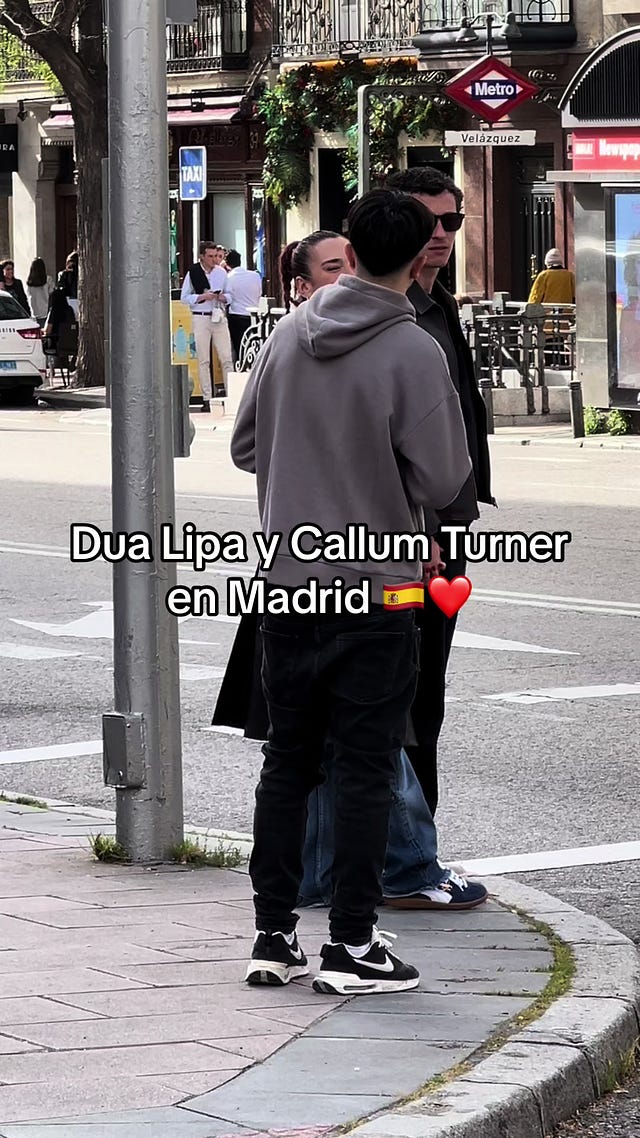🤬 This Week in Spain: Fear and Loathing on the Campaign Trail
Also: Puigdemont stirs the pot, Dua Lipa in town and Bildu candidate can't pronounce 'ETA was a terrorist group'.
By @IanMount and @AdrianBono | April 18, 2024 | Madrid | Issue #53
🎉 Welcome to The Tapa, an English-language, weekly newsletter about all things Spain!
🥜 This Week in a Nutshell: It’s a bad week to be a politician in Spain, especially if you are friendly with PM Pedro Sánchez. In the last few days, high-ranking members of the national government and its allied parties have been heckled, harassed, insulted and even pepper-sprayed. It’s getting bumpy in here!
🙏 Remember that if this email gets truncated at the bottom because it’s too long, just click here to read the rest on Substack.
🙌 One more thing: We are offering paid subscriptions, and we’d be thrilled if you purchased one to help build this enterprise we’ve had so much fun creating. (And to those of you who have already subscribed, thanks for the love 🥰.)
🕺If you haven’t subscribed yet, please do so by clicking on the button below.
🫶 And if you already have, please send this newsletter around to your friends and family and help us keep growing.
They weren’t saying ‘boo-urns’
🤬 Lots of heckling and a touch of physical violence
Bit of a sh*t week to be a Spanish politician, truth be told. Especially if you’re buddies with Prime Minister Pedro Sánchez (or if you are PM Sánchez). We would normally laugh and make some joke about chickens coming home to roost 🐣, but these things tend to get normalized and go from bad to worse (e.g. “Jan. 6 was a mix of peaceful protest and Capitol Hill tourism.”) so we’ll take it sorta seriously. Sorta. We’ll still make jokes. That is, after all, what we do to keep readers engaged.
OK, why now? As we’ve been chronicling (again and again), The rhetorical crapitude, personal attacks, and all-around whataboutism in Spanish politics has gone to 11 ever since Sánchez (of the center-left PSOE socialists) made a deal with Catalan separatist party Junts for the seven votes he needed to repeat as PM. Why? Because Sánchez
cynically agreed to do what he promised never to do“evolved his views” to foster greater national harmony by offering amnesty to pretty much every Catalan separatist involved in 2017’s illegal/unconstitutional/whatever referendum and the protests/clashes with police that followed.But wait, there’s more. On top of the investiture deal between Sánchez and Junts boss Carles Puigdemont, you have to add the COVID mask corruption/tax dodging allegations that struck 1) the Sánchez government, via an aide to former infrastructure minister José Luis Ábalos, and then 2) Madrid regional president/governor Isabel Díaz Ayuso, of the opposition PP, via her boyfriend. Welcome to the Whataboutism Olympics! Seriously.
Toxic stew, meet match. Into this sludge, stir regional elections in Basque Country and Catalonia. Regional elections in Spain—especially in these two autonomous communities—awaken a kind of insecure identitarian chest-thumping both inside and outside of them, like, “Are we all one big country or a handful of little countries in a bag called ‘Spain’? And if we’re that, if we’re different, then who’s better? Because different is just another word for better. And why do they have that money, my money? And what about my language? How can I make them speak it?” As you can see, it’s a mess.
Now, without further ado, let’s jump into this week’s unpleasantness. First up…
Pedro Sánchez and his broken, um, rear: During a Monday visit to Oviedo to present advances his government hoped to encourage in neonatological testing, the Prime Minister was met with a heckler who screamed (repeatedly), “You’ve got your ass torn for seven votes!” (“¡Por siete votos tiene el culo roto!”) in an, um, inelegant reference to his deal with Junts (see video above). “Fine, fine, fine, we’ve heard you. Now let me speak,” Sánchez said as the guy went on and on. We said “repeatedly”, right?
Imanol Pradales and the pepper spray. The candidate to lead the Basque government for the center-right PNV nationalists was attacked with pepper spray on Tuesday afternoon. Pradales had just given a campaign speech in the Bilbao suburb of Barakaldo and was preparing for a TV debate later that evening when the attack occurred. A 49-year-old man was arrested and the police said there was no political motive (really?). Leaders of parties across the political spectrum tweeted their support, and the candidate said that while it was hard to see in his left eye, the hospital said he just needed time to recover (he attended the debate). “These types of events have to lead us as a society to reflect on whether what we are experiencing—the creation of division, tension and aggravation—is the path for a society like the Basque one,” said PNV president Andoni Ortuzar. Amen.
María José Montero the “Traitor”. Treasury Minister/First Deputy Prime Minister María José Montero was attending Sevilla’s famous Feria de Abril over the weekend (because it’s a thing and she’s a Sevilla-born andaluza) when a group of well-dressed youths came up to her and began to chant “traitor” (“¡Traidora!”) at her. When she asked “Why? Why? No, no.” (always smiling because we’re all always on film now, okay?), they answered with “To Spain” and “To all Spaniards” so we’re going to make a big logical leap and say this has to do with that amnesty thingee.
Félix Bolaños’s Resignation. This one’s a bit different because it wasn’t over politics but rather about claims of 💩 governance. On a visit to an awards ceremony at Valencia’s justice center Tuesday, Bolaños (Minister of the Presidency, Justice and Parliamentary Relations) was met with a cacerolada (one of our favorite words as it is what it is—banging on a pot, or cacerola, in protest) by unhappy court union members demanding “Justicia solución, Ministro dimisión” (or “A solution for the courts and resignation for the minister”). Protests continued through the ceremony. At least no pepper spray or personal insults! Small wins, man. Small wins.
Only three days until the Basque elections and three weeks until the ones in Catalonia. If we can make it to the finish line without any massive blow ups, we’ll take the win.
But at least we all like paella and tortilla, right? (Let’s not get into the pro- v. anti-cebolla factional discussion here. Please.)
More news below! 👇
🔔 But First, A Message From Our Sponsor
Bucólico Café is a project of connection that was born as a specialty coffee shop.
We value time and understand that it represents both a cycle and an instant—chronology and nostalgia. Bucólico is a space that connects one’s soul with the purity, lightness and beauty of the countryside—while being in the city. Via a cup of coffee, a piece of cake or a song…
Located on Calle de Barbieri 4 — a few blocks from Plaza Chueca — Bucólico reassures the soul with a feeling of home.
Follow Bucólico Café on Instagram.
💬 Five things to discuss at dinner parties this week
1. 🎗️ Puigdemont makes yet another not-so-thinly-veiled threat to Sánchez
Another week, another interview with Catalan separatist Junts leader Carles Puigdemont. And, faithful to his style, Puigdemont once again warned that if things don’t go exactly how he wants, he’s ready to nuke the frail coalition government led by PM Sánchez.
The former regional president and current outlaw is hoping to get elected again in the May 12 Catalan elections. As we explained last week, he’s moved from his McMansion in Waterloo to a small town in France a few kilometers from the Spanish border (so close!), and is doing lots of interviews in an effort to compete with the other separatist leader, current regional president Pere Aragonès (from center-left ERC) who is running for reelection.
Puigdemont told Catalan online news site El Nacional (see video above) that if after the elections the center-left PSOE’s Catalan branch (the PSC) strikes an alliance with the center-right PP’s regional group in order to keep a pro-independence coalition from taking office, there will be “consequences” for Sánchez’s government.
Puigdemont called the deal-with-the-PP-to-thwart-Junts move “pulling a Collboni” in reference to the PSC’s Jaume Collboni, who became mayor of Barcelona last year thanks to the support of the PP and Barcelona en Comú parties—even though Junts had received the most votes (but not a majority of seats) in the municipal elections.
Puigdemont is suggesting that if the PSC candidate in Catalonia, Salvador Illa, decides to join forces with the PP to keep the separatists from office, the coalition government in Spain’s Parliament could lose Junts’ seven decisive votes.
"Nobody would understand if we continued to support someone who didn't win the elections, Pedro Sánchez, and who is president thanks to our votes," he said. "What possibility could there be for an agreement with the PSOE under these conditions?"
And that’s not all. When asked what would happen if Junts wins the elections but needs socialist votes to govern, Puigdemont responded that Illa "will know what to do," and warned that his party does not intend to "exchange anything" with him. (Not at all small-time mobster-y. Noooo. Not at all.)
Government formation will be tricky, according to the polls. Yes, Illa seems to be in pole position, but the post-electoral scenario is a “chessboard that would require the unity” of the non-separatist forces: the PP, Barcelona en Comú and, yes, maybe even Vox.
The socialist candidate in the meantime has declined to comment on a possible pact with ERC (or Junts for that matter) and has said that the only red line he will not cross when it comes to alliances is joining forces with "hate speech" parties such as Vox and far-right Aliança Catalana, with Sílvia Orriols at the helm.
For now, Puigdemont insists that in the case of a pro-independence majority (i.e. if Junts and ERC and maybe the far-left CUP together get enough seats to form a government), it is his “duty” to speak with his current rival Aragonès right after election night and “lead” the recovery of relations with his party. And presumably Aragonès “will know what to do”—or there will be “consequences.”
2. 🏥 The doctor will not see you now (maybe in six months)
Oh, boy. If an apple a day keeps the doctor away, start eating apples.
Things are not looking great at the Ministry of Health as new data collected from medical waiting lists around Spain was made public and it turns out that there are almost 850,000 patients who are, on average, waiting 128 days to undergo surgery in the public health care system. And yes, this is a historic high.
Wait but how. Yes, we know. We’re always taking pride in our universal healthcare, especially when compared to a certain country across the Atlantic that is most certainly not Canada. But hey, we said it was universal, not perfect.
The data for non-urgent surgeries and specialist appointments as of Dec. 31, 2023 really is staggering. One in four of patients have to wait more than six months to undergo a procedure in a healthcare facility in one of the 17 autonomous communities, Ceuta or Melilla.
It’s also the fifth consecutive semester in which these figures have reached maximum levels in like, ever, with one exception: June 2020, in the midst of the COVID-19 pandemic.
The average waiting time for a surgery is 128 days (8 more days than in 2022) and the percentage of patients waiting for more than six months increased by 3.5 points. The number of people waiting also increased, as 2022 closed with 793,521.
The medical specialty with the highest accumulation of waiting patients is traumatology, with 206,000, followed by ophthalmology, with 178,000, and general and digestive surgery, with 156,000.
The patients who wait the longest are those in neurosurgery, as 42.4% are on the list for more than six months (avg. 213 days); 40.8% of patients in the plastic surgery list also have to wait more than 180 days.
The management of waiting lists depends on the autonomous communities. So… how’s the experience in them? Not surprisingly, results may vary.
The communities with the most patients on the surgical waiting list in relation to their population are Cantabria (32.35 people per 1,000 inhabitants), Extremadura (28.78), and La Rioja (26.63). Those with the best data in this indicator are the Basque Country (9.54), Madrid (10.37), and Valencia (10.75).
The longest delays are recorded in Extremadura (181 days on average), Andalusia (174 days), and Cantabria (173), while the shortest are in Madrid (51 days), the Basque Country (63), and Galicia (67).
Health Minister Mónica García said that this was “a problem for patients” (pretty obvious if you ask us) and “for the country’s economy” (see video above).
The fix? Back in November, PSOE and Sumar sought to pass a law that would reduce the waiting time for surgery in the public health care system to a maximum of 120 days. But how could this be implemented, when the communities run the system? That, as they say, is still to be determined.
As you wait, be thankful at least you don’t need to sell your house to pay for surgery.
3. 🙊 Bildu candidate just can’t say the word—’Terr….terrorrrrr…” Nope, sorry.
You know it’s an upside-down campaign season when the PSOE government gets all angry with one of their lefty allies for not saying something the righty opposition PP is always saying. But that’s where we are.
How it started. Pello Otxandiano, EH Bildu’s candidate to head the Basque Country (aka Euskadi) regional government after this Sunday’s elections, had an interview on Cadena SER. EH Bildu is a left-leaning Basque separatist party with some leaders who were members of the Basque separatist terrorist group ETA so it’s, like, controversial. Still, the PSOE works with it at a national level (because politics, and Bildu’s been trying to shed the terrorist thing), though the PSOE says it won’t support Bildu at the Basque regional level (because more politics).
The questions. Cadena SER asked Otxandiano if ETA was a terrorist group. Now, this is not a hard question. In its quest to form an independent Basque state, ETA killed about 850 people between its formation in 1958 and its disbanding in 2018, including 21 killed in a 1987 supermarket bombing in Barcelona that counted several children and a pregnant woman among its victims.
The answer. Otxandiano couldn’t say the obvious because some Bildu supporters and leaders believe that yeah, ETA went too far, but the government was killing them back and doing it dirty, and plus Franco was around for part of that time. So he said, “ETA was an, um, armed group. The labels can vary, state violence can also have different titles, but I don't think that is the issue.” Which is sort of like saying Charles Manson was a “bearded man” when asked if he was a murderer (for the Gen Z readers who have no idea who Manson was, you should know he was a pretty bad guy).
This caused much rending of garments in the PSOE-led government. The right side of the aisle (aka PP and Vox) has been having a Munch-like scream 😱 ever since the PSOE started working with EH Bildu to keep its coalition afloat, saying that the PSOE was in bed with terrorists (or terrorist sympathizers at best). So EH Bildu had been working to moderate its image to make it (and the PSOE’s alliance with it) more palatable. But now it looked like Otxandiano had blown that up and proven the PP right.
Split second reaction time. Allies in the governing coalition quickly put daylight between themselves and Otxandiano. Sumar’s candidate for Basque government boss, Alba García, said it was “obvious” that ETA was a terrorist group and, referring to the group’s victims, added that, “what ETA's terrorism meant for Euskadi was a lot of pain and a lot of suffering and we cannot take it lightly.”
The PSOE went further. The government was clearly irked, and Pilar Alegría, Education Minister and government spokesperson, squeezed all the PSOE anger into a short paragraph: “Not only is he [Otxandiano] a coward, but this shows absolute contempt for the victims,” she said. “He demonstrates a denialism absolutely incompatible with the history of our country and with democracy” (see video above).
The PNV kept it simple. Current Basque Country/Euskadi governor Iñigo Urkullua asked Otxandiano some (pointed) questions: “853 victims, what is that? Is it a change of cycle? What do you say to the families of the victims? What do you say to the thousands of injured?"
Making up: This morning, Otxandiano said in an interview with Radio Euskadi that he wanted to “apologize to the ETA victims” for his statements to Cadena SER but still stopped short of referring to the terrorist group as, well, a terrorist group.
So Otxandiano is now toxic kryptonite and no-one will work with EH Bildu, right? Hahaha. No. Once this passes, regular programming will start anew. Without EH Bildu, it will be hard to form a Basque government—and impossible to keep the national one going.
4. 🚌 What Bus 116? You must be mistaken. Go home
Barceloneses (as in, people in Barcelona) are really tired of crowds of tourists. “How tired?” you ask. So tired they made a tourist-friendly bus line just disappear. Seriously.
Barcelona recovered its tourism mojo/curse in 2023 after several years of (probably welcome for some) COVID-inspired travel slowdown. The city had some 15.6m visitors in 2023, according to the local tourism observatory, roughly in line with 2018 and not far below the crazy tourism record madness year of 2019, when 17.4m visitors arrived and drove the locals batsh*t crazy.
The two biggest attractions? The Sagrada Familia basilica, and Parc Güell, both Antoni Gaudí productions and two places we’re pretty sure you’ve already been to. You can’t do much about people gawking at a church in the middle of a city, so the tourists own that one. But people figured if you can’t get into a park, maybe that would keep them away?
Barcelona began charging entrance fees for Gaudí’s famous Park Guëll in 2013, and expanded the for-pay area after COVID. And it did work! Between 2019 and 2023, the number of tourists who entered dropped from 9m to 4.4m.
But not entirely. You see, 4.4m people is still a lot of people, and when they have to get to Park Guëll, which is up a very steep hill, they tend to look for a bus. Specifically, Bus 116.
Bus 116 got so crowded with tourists that there was often no room on it for residents of the La Salut (the neighborhood the park is in). Most of them couldn’t get on, not even those with mobility problems. Said residents protested. For years. We expect they must have really started to get on their kids’ nerves, no?
Then someone had a devious little idea. In a city hall commission in February, Councilman for Security and Coexistence Albert Batlle dropped a hint: His team was working to “remove it from routing tools and other Internet references.”
The subject wasn’t mentioned again and city hall wouldn’t comment directly, but the route of Bus 116 has now disappeared from Google Maps (and, it seems, Apple Maps), which apparently has had a surprisingly massive effect on tourist usage of the bus line. As in, they don’t use it any more.
“At first we laughed, it seemed absurd to us, like putting doors to the countryside,” said Cesca Sánchez, from the Park Güell, La Salut and Sanllehy Neighborhood Association. “But we are amazed because the measure is being effective.”
Now, Sánchez jokes, they want to take the change one step further: “The next proposal will be to remove the entire Park Güell from Google Maps.”
P.S. Just because we’re naughty peeps, the video at the top of this story shows the entire route of the 116, in case you’d like to take it. No, thank you.
5. 💃 Dua Lipa loves herself a little Spain
 Tiktok failed to load.
Tiktok failed to load.Enable 3rd party cookies or use another browser
Dua Lipa took time to have some fun on a recent visit to Spain and basically set TikTok on fire with all the short videos people took of her walking around the streets of Madrid’s Barrio Salamanca with boyfriend Callum Turner (above). But let’s go back to the start of her Spain whirlwind—in Barcelona.
The English/Albanian/Kosovar pop sensation began by giving a private concert in Barcelona’s Palau Sant Jordi for attendees at…McDonald’s Worldwide Convention 2024. Really? Yes. Stars got to do these things to make bank. Life can’t all just be riding mechanical bulls in music videos. Now, talking about music videos…
Dua Lipa’s other big Barcelona-related agenda item? While in Spain, she announced the release of her new song, “Illusion”, and the video for it, which was filmed at Piscines Bernat Picornell. Those are the pools built for the Barcelona 1992 Olympics on Montjuïc, which are pretty amazing and offer fantabulous city views (they’re open to the public—not just Dua Lipa—if you’ve ever in town…).
But then Dua Lipa got into the real stuff—flouncing around Spain’s fun spots and recording it all on Insta for posterity under the slogan “disfrutando mucho” (because if it’s not on social media, it never happened).
In Barcelona, there was an image of the Joan Miró painting ‘El oro del azur' at the Fundación Miró and a meal at Gresca, and a flamenco show (somewhere).
In Madrid, there were lots of food stops—at Chamberi’s Sala de Despiece (she went #ponzaning !), Dani García’s BiBo (with Pedro Almodovar, Tilda Swinton and Julianne Moore, the last two of whom are starring in Almodovar’s first film in English, The Room Next Door), and all-time sweet tooth fave Chocolatería San Ginés. And then there’s that gaggle of civilian videos of her rocking around Salamanca with Turner. It was like she was on vacation or something.
Definitely a step up from McDonald’s… Just saying.
🙏 Before you go, please remember to share this newsletter with your friends on social media. The more we grow, the more information we’ll be able to offer each week.







